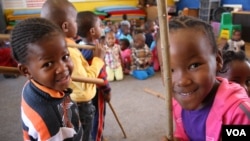In a cold pre-fab building in Soweto, the sprawling township south of Johannesburg, a favorite part of the day begins for 80 children… It’s music time at Mapetla Crèche. They smile, swing and sway as a song washes over them.
There’s writing on a blackboard, and toys and story books scattered on the floor. It looks like a normal playschool… Until the three-year-old boys and girls form a line, and a teacher begins injecting liquid medicine into their tiny mouths.
The children are infected with HIV. The antiretroviral syrup is keeping them alive.
Every year, many thousands of South Africans die of illnesses linked to HIV and of infectious diseases such as tuberculosis. The death toll from non-communicable conditions such as cancer is also high.
Many of South Africa’s dead leave children behind - the hidden cost of South Africa’s various health epidemics.
Trauma
A teacher questions one of the girls. She has a virus and battles to breathe, talking in croaks. Other caregivers discuss a boy’s ill-health, as he stands in a corner coughing. The child’s eyes flash. He shakes his head vigorously, his arms in a spin.
“He’s very short-tempered. He wants to do things at his own time; he doesn’t like listening,” says teacher Dolly Lethulwe.
Many of the children at Mapetla Crèche have psychological and behavioral problems, she says, because they’re traumatized. HIV-related illnesses, among other conditions, have killed some of their mothers and fathers.
Lethulwe says they talk about taking their mothers to cemeteries to place sand on the tops of their coffins. My mother’s sleeping there, they tell Lethulwe.
Other children are at the school because their parents are too sick to care for them. “Some of the adults are very irresponsible. They have TB and HIV and other things but they don’t take their treatment properly,” says another teacher, Audrey Malahlela. “And when they wake up, it’s too late.”
‘Terrible pictures’
Dressed elegantly in a black suit, Mapetla Crèche principal Lucky Pekane points to several colors on a poster and her pupils scream in unison, “Red! Blue! Yellow!”
Pekane says the children come from very poor families. They tell her, ‘Yesterday I went home and then we didn’t eat.’ Or, ‘Mummy was fighting daddy… Mummy was spitting at daddy.’
Pekane says art class reveals a lot about the youngsters’ lives away from Mapetla, in the evenings, at weekends and on holidays when guardians are supposed to be caring for them.
“When we do the drawings, they will draw some pictures that are terrible,” she says. In one, a black stick figure is spread-eagled on grass with a red stream flowing out of it; another stick character holds what appears to be a jagged knife.
Malahlela says certain drawings indicate some kids are being assaulted at home.
Transformed by love
Lethulwe says the children are used to being treated “very harshly.” Her response is to shower affection on them. “You must hug them, hug them; show them love. Just kiss them on the forehead; just hold hands.”
Malahlela also welcomes the challenge of caring for troubled youngsters. “I like the children like my own children. I’m not teaching them; I’m developing them!” she exclaims. “I love them … When I’m not at school I’m getting frustrated, because I like their noises!”
During a lesson, a teacher is forced to quiet excited pupils as they squeal and shout and swarm to all corners of the crèche. It’s difficult to believe some of them were once almost dead because of lack of treatment for their conditions … Unable to move, or to make a sound.
Lethulwe says the best part of her work is watching “sick, disturbed and grieving” children turn into fun-loving extroverts. “Some will come: Teacher, teacher this, teacher, teacher that! Teacher! Teacher!
“It gives you a smile in your face!” Lethulwe exclaims. “It means you are somebody important in somebody’s life! When you think about them you say: ‘You know what? I’m doing something wonderful. God knows that.’”
Some die when they leave
The crèche can only afford to care for the youngsters until they’re six, when they start proper school. They’re then released to a relative, a family friend, or their own ill parents.
Their departure from Mapetla causes their teachers great anxiety, says Lethulwe.
“I’m worried about them, how are they coping right now? They are not in my care anymore. Are they taking care of them nicely?
“I just wish that maybe we can have an aftercare (facility), maybe, for them, and maybe give them that love again. I know they miss it.”
When children leave the crèche, says Lethulwe, they’re often neglected. She says some die when they stop taking their medication. She tells of a former pupil, a seven-year-old boy, who was left alone in a shack one day and ate something he shouldn’t have.
“He was poisoned; he was poisoned!” Lethulwe shouts. “If he had proper care, that guy will be living today. He will be taking his ARVs (antiretroviral medication for HIV) okay and life will be perfect.”
But life is far from perfect – and always uncertain - at Mapetla Crèche. It gets no government help. Its meager donor funds are running out, fast.
The kids bring another day to a close with a hymn.
Pekane says whenever she hears them sing, she fears it will be their final song. And one of the few havens of hope in disease-wracked South Africa will close its doors, forever.









